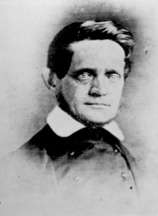John Hemphill (senator)
| The Honorable John Hemphill | |
|---|---|
 | |
| United States Senator from Texas | |
|
In office March 4, 1859 – July 11, 1861 | |
| Preceded by | Sam Houston |
| Succeeded by | Morgan Hamilton |
| Personal details | |
| Born |
December 18, 1803 Chester District, South Carolina, U.S. |
| Died |
January 4, 1862 (aged 58) Richmond, Virginia, C.S. |
| Nationality | American |
| Political party | Democratic |
| Alma mater | Jefferson College |
John Hemphill (December 18, 1803 – January 4, 1862) was Chief Justice of the Texas Supreme Court, and a United States Senator.
Early life and career
Hemphill's father was a Presbyterian minister, The Reverend John Hemphill, who emigrated to the United States from County Londonderry, northern Ireland.[1] His mother, Jane Lind, was also Scots-Irish but was born in Pennsylvania, where they met and married. John Hemphill the younger was born in South Carolina. He was educated at Jefferson College, graduating in 1825. He studied or "read the law" with David McCloud and was admitted to the bar in South Carolina in 1829.
Migration to Texas
Several years later, in 1838 Hemphill moved his practice to Texas after it became an independent republic. Realizing that it was strongly influenced by Spanish law, he learned Spanish and studied its laws in order to be successful in this new environment.[2]
Marriage and family
Hemphill never married.[3] He lived with his slave Sabina for more than a decade and had two daughters with her. He arranged for their education, sending them in the late 1850s to the newly founded Wilberforce College in Ohio, considered a "training ground" for abolitionists before the Civil War.[4]
Career
A friend of Sam Houston, Hemphill was appointed and served as Chief Justice of the Texas Supreme Court from 1841 to 1858, serving as the top jurist in the Republic of Texas and then in the State of Texas.[4] During this period, Texas was an independent republic and then a state in the United States before the Civil War.
He was called the 'John Marshall' of Texas for the role he played in the development of Texan law from the republic's early years, "laying the foundation of its judiciary system."[1][2] The challenges were far beyond the law; Hemphill became known for an incident in which he fought Indian warriors who had attacked him in a courtroom while his court was in session.
Hemphill was considered an expert on Spanish and Mexican law, and he considered Spanish civil law to be superior to common law in many areas, especially in relation to property. He is remembered for expanding women's rights so that women could inherit equally. He also supported homestead rights in an adoption of principles of Spanish civil law.[2] Hemphill was elected in 1858 to replace Sam Houston as United States Senator from Texas when Houston would not support the right of states to secede from the United States. He served from 1859 to 1861.
As Texas was one of the first seven states to secede from the Union, Hemphill was among the fourteen United States Senators expelled by Congressional resolution in 1861. He was subsequently chosen as a Texas delegate to the Provisional Confederate Congress, a position he held until his death in Richmond, Virginia.
Legacy
Hemphill County,[5] Texas, and Hemphill, Texas, are both named in his honor.
Familial connections
John Hemphill was a cousin of Charles Hare Hemphill, Lord Hemphill through his father, The Reverend John Hemphill.
Further reading
- Timothy S. Huebner, The Southern Judicial Tradition: State Judges and Sectional Distinctiveness, 1790–1890 (1999).
See also
References
- 1 2 "John Hemphill", Gale Encyclopedia of Biography, at answers.com
- 1 2 3 Hart, James P. "John Hemphill - Chief Justice of Texas." Southwestern Law Journal 3 (fall 1949): pp. 395-415
- ↑ John Hemphill from the Handbook of Texas Online
- 1 2 Gary Nash, "Forbidden Love" (excerpted from his book, Forbidden Love: The Hidden History of Mixed-Race America, (1999), at Frontline: Jefferson's Blood/Mixed-Race America, PBS, 2000, accessed 24 September 2014
- ↑ Gannett, Henry (1905). The Origin of Certain Place Names in the United States. Govt. Print. Off. p. 154.
External links
- United States Congress. "John Hemphill (id: H000468)". Biographical Directory of the United States Congress.
- John Hemphill from the Handbook of Texas Online

